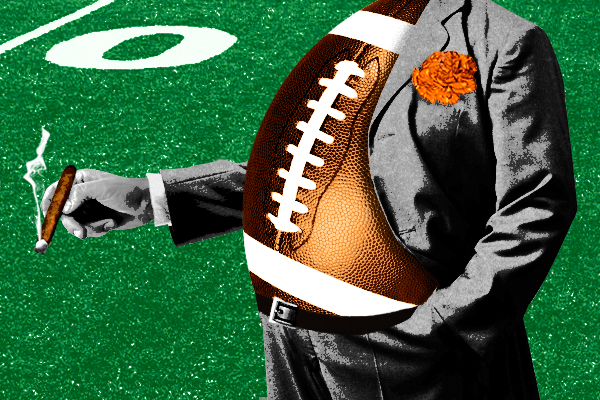I have followed and written commentaries about big-time sports at UT Austin for some fifteen years. Between 2008 and 2011, I was UT and Big XII representative on the national Coalition on Intercollegiate Athletics. I was invited to lunch by former athletics director DeLoss Dodds, who knew and adeptly practiced the art of keeping your enemies closer. I sat in his and President Bill Powers’ skyboxes — the idea seemed to be that I would find this misuse of adult time and tasteless display of conspicuous consumption that should find no place at a public university so desirable that I would not rock the boat in the future.
It did not have that effect.
At Dodds’s insistence, I even had personal sit-down time with soon-to-be-disgraced Penn State University football coach Joe Paterno — his revered high-school mentor, Fr. Thomas Bermingham, S.J., had once been a dear colleague of mine at Fordham University. And I heard Graham Spanier, then president of PSU, emphasize to COIA reps in January 2011 what high moral standards he enforced within his entire NCAA athletics program, top to bottom. Ten months later, Jerry Sandusky….
In 2009-2010, I thought we had reached the promised land. Then U.S. Secretary of Education Arne Duncan, who had been a student athlete at Harvard, then NCAA president Mark Emmert, and then President of the United States Barack Obama all called for “independent faculty oversight of NCAA programs at universities and colleges.” Emmert told us that it was a bad idea for any institution of higher education to have separate fund-raising organizations for academics and athletics, as UT Austin still does: Texas Exes and the Longhorn Foundation. I brought these proposals to the floor of the faculty council.
It turns out that no University of Texas president wants to lift his rod and take us across to the promised land of real educations for all student athletes and serious integration of sports into the academic, cultural and scientific mission of our great public university. Instead we stay in the land of smoke and mirrors, make-believe, and even immoral looking-the-other-way.
Recently, I got on-line with the Longhorn Foundation to see what ordering season tickets for this fall would entail. Three tickets in Section 28 for 6 games were each $660, total $1,980. But those tickets will not be sold to anyone without a $2,500 ‘donation’ to the Longhorn Foundation for each ticket. So, three tickets cost $9,480 and $7,500 is considered a voluntary tax-exempt donation to higher education. I would say this is the morally gray world our University leaders tolerate, but it is just black-and-white wrong.
Okay, so they raise lots of money this way. What does the football program do with it? Well, our program this spring videoed its new head coach Tom Herman taking a sledgehammer to football lockers in good repair. They were all replaced with $10,500-apiece lockers that UT director of high school relations proudly proclaimed via Twitter as “unfreakingbelievable.” The Dallas Morning News called them “uncharted territory” in a “college football world where a teams’ facilities are pretty much indistinguishable from a high-end Vegas hotel.” Worse yet, UT President Greg Fenves explained, “You have to impress 16 and 17-year-old kids when you’re looking at locker rooms across the country.”
I disagree. No, you do not. You are not a pimp or a drug-pusher. What you should do is sit down with those players and their parents or guardians or favorite teachers and tell them this: “If you come to UT Austin, we run a tight ship. We don’t want to outdo Las Vegas in order to fool you into thinking a few years spent in glamorous facilities will mean something to you and your families in ten, twenty, thirty years. We’ll give you a real education. We’ll limit your playing and practice time to the NCAA regulation of 20 hours a week. We won’t be like all those other conniving programs where players spend 37-43 hours according to the NCAA’s own survey. We’ll teach you how to keep to a budget so you won’t blow $28,000,000 in NFL salary as UT’s Vince Young did, or the $30,000-$50,000 you’ll hopefully be making at first after you graduate. We’ll look out for you.”
But no, we won’t.
Thomas G. Palaima is the Robert M. Armstrong Centennial Professor in the Department of Classics at The University of Texas at Austin.
